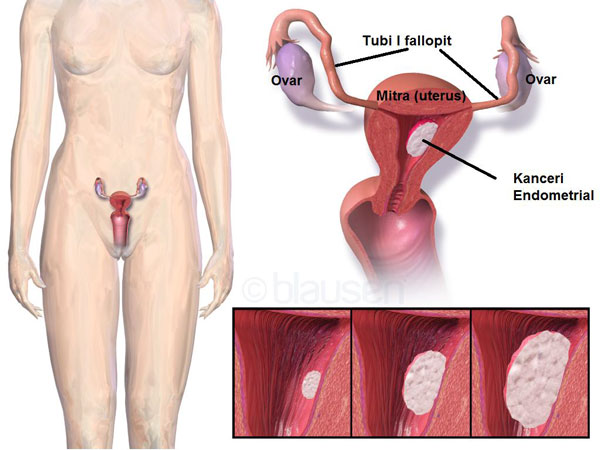Endometrial Cancer
What is it?
Endometrial cancer is what in everyday language is also called uterine cancer (although this latter term is not used by doctors). The endometrium is the layer that lines the cavity (the uterine cavity). Endometrial cancer occurs when endometrial cells start to grow in an uncontrolled and chaotic way. It is a relatively common cancer that usually occurs after a woman has entered menopause and is older than 45 years.

The uterus (womb) is the main genital organ in females and functions to develop and nourish the fetus during the 9 months of pregnancy. The uterus consists of a thick muscular wall called the myometrium and a thin layer that lines the cavity - the Endometrium. The endometrium is very sensitive to hormones and undergoes cyclic changes during the menstrual cycle.
The endometrium is designed in such a way to provide / ensure the ideal environment for the fertilized egg so that it can implant and start growing. If pregnancy does not occur, then the endometrium is evacuated (comes out) through menstruation.
The hemorrhage that a woman experiences during menstruation consists of a mixture of the endometrial layer, blood, and mucus.
More than 95% of uterine cancer cases occur in the endometrium. For this reason, when uterine cancer is mentioned, it often refers to endometrial cancer.
Why does endometrial cancer form?
Although the definitive cause of endometrial cancer is still not known, there are various factors that increase the risk of a woman developing endometrial cancer. This includes age, obesity, and having certain diseases such as hypertension or even diabetes. Also, a higher than average risk of developing endometrial cancer has been noted in women with irregular menstruations, those who had their menstruation start earlier in life, and those who went through menopause later.
What are the signs of endometrial cancer?
Endometrial cancer has good treatment prospects because its symptoms are evident from the early stages of the disease. The most common sign is abnormal or unusual vaginal bleeding and / or the discharge / secretions of dark brown color. Especially women who have entered menopause, when they experience such signs, present relatively quickly to the gynecologist, making the cancer diagnosed in the early stages. Pain in the lower abdomen or the presence of a mass that is visible through ultrasound appear in the later stages.
How is endometrial cancer diagnosed?
If the gynecologist suspects the presence of endometrial cancer, then they will request a series of tests / examinations with the aim of confirming the diagnosis. These include:
- Taking a family history of gynecological diseases
- Taking the patient's personal gynecological history
- Taking the history of complaints that have prompted the patient to present for consultation.
- Gynecological examination
- Gynecological ultrasound
- Endometrial biopsy – A small part of the endometrium is taken through the aspiration of the cavity via special cannulas called Pipelle or through uterine curettage. This material is sent for biopsy (histo-pathological examination) with the aim of the final confirmation of the diagnosis.
How is endometrial cancer treated?
The treatment and prognosis depend a lot on the stage at which endometrial cancer is diagnosed. Treatment includes surgery, radiotherapy, hormonal therapy, and chemotherapy.
- Surgery is the best treatment when the cancer is diagnosed in the early stages.
- Radiotherapy uses high-energy radiation from X-rays and Gamma rays to eliminate cancer cells. The side effects of radiotherapy are numerous (for example, premature menopause). The decision to use radiotherapy depends on the stage of the disease.
- Chemotherapy uses different anti-tumor drugs to eliminate cancer cells. These drugs are given in the form of tablets or intravenous injections. To give a better effect, combinations of chemotherapy drugs are usually given. The side effects of chemotherapy are numerous. Here we mention nausea, vomiting, weakness, premature menopause, hair loss, etc. Chemotherapy is usually reserved for advanced stages or for recurrences because it is not as effective as surgery or radiotherapy.
- Hormonal therapy uses drugs based on progesterone which has the effect of slowing down (but nothing more than that) the growth / multiplication of cancer cells. These drugs are given in the form of tablets. This therapy is reserved for advanced stages or as a complementary alternative to other options.
What are the chances of treatment?
Fortunately, in most cases, endometrial cancer, because it is diagnosed early, has good chances of treatment. If we talk about the early stages, 95-96% of patients survive the 5-year interval or more than that. Can it be prevented?
In order to prevent the occurrence of endometrial cancer or delay in diagnosis, women should follow the following steps:
- To report any abnormal episode of vaginal bleeding.
- To control obesity, hypertension, and diabetes.
- Use of oral contraceptives has been seen to reduce the risk for endometrial cancer.
- If women are taking estrogen-based hormone replacement therapy in menopause, it is good that it is balanced by taking progesterone in order to neutralize the negative effects of estrogens.
- To have periodic check-ups with the gynecologist.